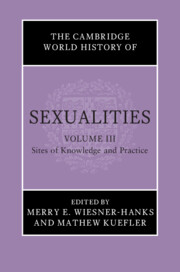Book contents
- The Cambridge World History of Sexualities
- The Cambridge World History of Sexualities
- The Cambridge World History of Sexualities
- Copyright page
- Contents
- Figures in Volume III
- Tables in Volume III
- Contributors to Volume III
- Editors’ Preface to the Series
- 1 Sex in Athens in the Fifth and Fourth Centuries bce
- 2 Sex in Rome in the First Century bce and the First Century ce
- 3 Sex in Constantinople in the Sixth Century ce
- 4 Sex in Chang’an in the Eighth and Ninth Centuries ce
- 5 Sexuality in Baghdad in the Ninth and Tenth Centuries ce
- 6 Sex in Heian-kyō (Kyoto) in the Tenth through Twelfth Centuries ce
- 7 Sex in Iceland in the Fourteenth and Fifteenth Centuries ce
- 8 Sex in Florence in the Fifteenth Century
- 9 Sexuality in Tenochtitlan in the Early Sixteenth Century
- 10 Sex in Sixteenth-Century Istanbul
- 11 Sex in Geneva in the Sixteenth Century
- 12 Sex in Eighteenth-Century Edo (Tokyo)
- 13 Sex in Eighteenth-Century Paris
- 14 Sex and Sexuality in Eighteenth-Century Philadelphia
- 15 Sex in Nineteenth-Century Cairo
- 16 Sexual Pleasures and Perils in Nineteenth-Century London
- 17 Sex in Manila in the Late Nineteenth and Early Twentieth Centuries
- 18 Sex in Lagos from the Mid-Nineteenth to the Mid-Twentieth Century
- 19 Sex in Bombay in the Late Nineteenth and Early Twentieth Centuries
- 20 Sexuality in a Distant Metropolis: Buenos Aires from the Late Nineteenth to the Mid-Twentieth Century
- 21 Sex in Early Twentieth-Century Berlin
- 22 Sex in Sydney in the Twentieth Century
- 23 Toronto the Good, Toronto the Gay: Sex and Morality in the Twentieth Century
- 24 Sex in Shanghai in the Twentieth Century: Intimate Negotiations
- 25 Sex in Twentieth-Century Rio de Janeiro
- Index
- CONTENTS TO VOLUMES I, II, AND IV
- References
19 - Sex in Bombay in the Late Nineteenth and Early Twentieth Centuries
Published online by Cambridge University Press: 26 April 2024
- The Cambridge World History of Sexualities
- The Cambridge World History of Sexualities
- The Cambridge World History of Sexualities
- Copyright page
- Contents
- Figures in Volume III
- Tables in Volume III
- Contributors to Volume III
- Editors’ Preface to the Series
- 1 Sex in Athens in the Fifth and Fourth Centuries bce
- 2 Sex in Rome in the First Century bce and the First Century ce
- 3 Sex in Constantinople in the Sixth Century ce
- 4 Sex in Chang’an in the Eighth and Ninth Centuries ce
- 5 Sexuality in Baghdad in the Ninth and Tenth Centuries ce
- 6 Sex in Heian-kyō (Kyoto) in the Tenth through Twelfth Centuries ce
- 7 Sex in Iceland in the Fourteenth and Fifteenth Centuries ce
- 8 Sex in Florence in the Fifteenth Century
- 9 Sexuality in Tenochtitlan in the Early Sixteenth Century
- 10 Sex in Sixteenth-Century Istanbul
- 11 Sex in Geneva in the Sixteenth Century
- 12 Sex in Eighteenth-Century Edo (Tokyo)
- 13 Sex in Eighteenth-Century Paris
- 14 Sex and Sexuality in Eighteenth-Century Philadelphia
- 15 Sex in Nineteenth-Century Cairo
- 16 Sexual Pleasures and Perils in Nineteenth-Century London
- 17 Sex in Manila in the Late Nineteenth and Early Twentieth Centuries
- 18 Sex in Lagos from the Mid-Nineteenth to the Mid-Twentieth Century
- 19 Sex in Bombay in the Late Nineteenth and Early Twentieth Centuries
- 20 Sexuality in a Distant Metropolis: Buenos Aires from the Late Nineteenth to the Mid-Twentieth Century
- 21 Sex in Early Twentieth-Century Berlin
- 22 Sex in Sydney in the Twentieth Century
- 23 Toronto the Good, Toronto the Gay: Sex and Morality in the Twentieth Century
- 24 Sex in Shanghai in the Twentieth Century: Intimate Negotiations
- 25 Sex in Twentieth-Century Rio de Janeiro
- Index
- CONTENTS TO VOLUMES I, II, AND IV
- References
Summary
The chapter provides an insight into the complex sexual milieu of Bombay in the late nineteenth and early twentieth centuries. Beginning with the Rajabai Tower case as a key narrative, numerous facets of the city, such as cosmopolitanism, group identities, the link between forensics and sexual assault, racial profiling, and police corruption, are discussed. Also examined are the spatial controversies surrounding Bombay’s red-light neighbourhoods and links between spatiality and the identity of prostitutes. Pop culture’s role in shaping a sexual ethos, in Parsi theatre and later Bombay cinema, and particularly the unique position of performative androgyny, is reviewed. Further, the impact of contagious disease acts and the fluid definition of prostitution is studied. Finally, the role of eugenics is surveyed, and the extremely divisive and convoluted politics of the eugenics movement is analyzed.
Keywords
- Type
- Chapter
- Information
- The Cambridge World History of Sexualities , pp. 402 - 418Publisher: Cambridge University PressPrint publication year: 2024

